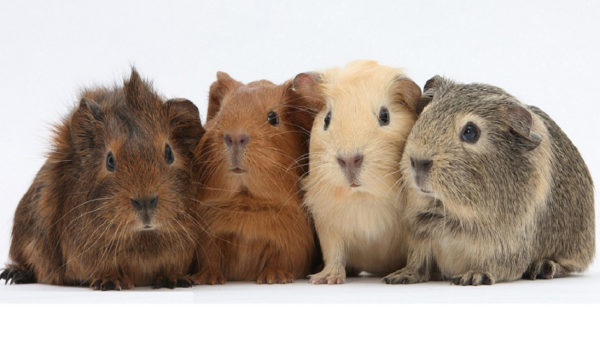Guinea Pigs can make great pets but it is always wise to find out as much as you can before buying a Guinea Pig. Here, Tamara Labelle from ExoticDirect shares with Pet Problems Solved what you need to know…
What you need to know before buying a Guinea Pig
Guinea pigs live for up to 8 years
Before you buy your Guinea pig consider whether you’ll be able to provide all the care and attention it needs for the whole of its life.
Guinea pigs can live for up to eight years, meaning that small children may begin to lose interest as they grow up. And if the Guinea pig is for you consider whether your future lifestyle is likely to change, impacting on the amount of time you have for your pet.
Guinea pigs are social animals
Good things come in packages. And in the case of Guinea pigs, two is the ideal number. A neutered male and female works best. However, if this isn’t possible, two females will also work, but you’ll need to ensure both have a similar temperament to help avoid bullying.
Don’t be tempted to keep a Guinea pig and rabbit together, because not only will your Guinea pig get lonely – rabbits are very quiet and don’t communicate through squeaks. But rabbits often bully Guinea pigs.

Insurance for Guinea Pigs
Should your Guinea pig become poorly, he may need a vet visit, so it’s a good idea to have pet insurance to cover the bills. You may want to put money away instead, however this method doesn’t always work for everyone. Unexpected bills and commitments can take their toll on savings goals.
For peace of mind, ExoticDirect cover up to £2,000 in vet bills for each Guinea pig you insure. You can pay by Direct Debit, meaning once the policy is set up, you can forget about it.
Getting the diet right
Lots of hay is the most important food. By eating this, your Guinea pig will grind his teeth down and help to keep his gut moving and working properly. Without adequate hay, your Guinea pig could develop overgrown teeth and gut stasis, a condition where the digestive system slows right down or stops moving.
Along with hay, pellets containing vitamin C are a good idea. As piggies don’t produce their own Vitamin C, it’s up to you to provide it. A lack of vitamin C can lead to scurvy.
You can also provide vitamin C by feeding vegetables rich in the vitamin, and the occasional piece of fruit.
Fruit, although seemingly healthy, actually contains a high amount of sugar, which, you’ve guessed it, can be bad for your piggies teeth, as well as his waistline. So proceed with caution here.
Lots of space to play
Nobody likes being cooped up all day, and that goes for your Guinea pig too. Your piggy will need lots of room to run, stretch and play. If you’ve got more than one piggy, you’ll need enough space for all of them to behave just like Guinea pigs do.
He’ll also need to have a hutch large enough for all your piggies to sleep in. If outside the run or play area can be attached. Try to set this up before buying a Guinea Pig.

Inside or outside?
Guinea pigs can be kept outside all year, however, extreme temperatures and weather conditions can pose problems. Too hot and your Guinea pig could get heatstroke and too cold and he’ll get chilled. The ideal temperature is between 18 – 23 degrees.
So whether your piggy is indoors or outside you’ll need to ensure his temperature is right and that he’s protected.
If indoors, don’t put your Guinea pig near radiators or open windows. Your piggy’s home will also need to be somewhere quiet as they have sensitive hearing and can get startled easily.
You’ll need to keep other pets away from them as well. Guinea pigs are prey animals, and may be perceived as a target, or feel threatened by other pets.
And if outdoors avoid direct sunlight and draughts and ensure the hutch is weatherproofed. Don’t be tempted to put the hutch in the garage as car fumes will be toxic for your piggy.
Keeping things clean
Your Guinea pig’s home and run will need to be cleaned regularly. Damp or wet hay can lead to problems like bumblefoot, a foot infection. Aim to use dust free hay, as dusty varieties can cause eye infections.
Your Guinea pig will need regular grooming to prevent matted fur, especially if you have a long haired variety.
You’ll also need to keep your Guinea pig’s bottom clean, particularly in warmer months, as this could attract blowflies.
Flies can lay their eggs around your Guinea pig’s bottom, and the hatching maggots will burrow into your pet’s skin, causing extreme pain and discomfort. Immediate vet attention is required, or your piggy could pass away. You can find a vet here.
Breeding
It’s not recommended to breed Guinea pigs unless you’ve got plenty of experience. So don’t be tempted by the thought of lots of baby Guinea pigs.
Females are sexually mature by around one month of age, however, by around six to eight months of age they’re physically unable to give birth. This is because their pelvic bones fuse together.
If you’re keeping the opposite sex together, ensure the male is neutered.
Play
Guinea pigs will enjoy playing in tunnels, boxes with an entrance and exit, and balls. You can also make toys stuffed with hay for your Guinea pig to forage and play with.
You can experiment with what your piggy likes to play with. But they always like to run around and explore.
Now you know lots of things to consider before buying a Guinea pig!
Insure your Guinea pig for £2,000 of vet fees with ExoticDirect. Insurance only available to UK residents.





